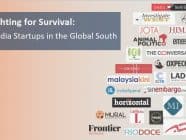
Project R, the Swiss start-up which recently ran a successful crowdfunding campaign and will launch its online magazine in 2018, is trying a different approach.
Media start-ups, from established news platforms including Buzzfeed in the US and Mediapart in France, to more recent concepts such as Switzerland’s Project R, are often considered models of innovation, inspiration and radical funding ideas, offering hope for the future of journalism. However, recently published German research indicates new ventures rarely fulfil this promise.
For the study Re-organising journalism. A study on the formation of new media organisations I examined 15 German media start-ups. The results suggest that journalism entrepreneurs usually set out with optimism, energy, and an aim to encourage independent democratic discourse, but many misjudge the challenges they will face when establishing their projects.
Main findings:
- New media ventures are primarily started from a “creators’ perspective”. This is unlikely to focus on innovation, but rather tries to transfer professional standards of journalism to digital media environments. Media start-up founders often aim at producing high-quality content, (increasingly rare in editorial offices affected by cost-cutting and downsizing) rather than on profit and growth.
- Some start-ups copy the out-dated revenue models of daily newspapers. However, they quickly face the same problems as established media houses: readers are generally unwilling to pay for online content, while advertisers have become reluctant to advertise in journalistic environments because they have found more effective ways of reaching potential buyers.
- Start-ups that occupy niche themes and reach specific communities – for instance passionate motorcyclists or career-oriented millennials – find it easier to earn money. By knowing their users’ needs these ventures can experiment with new sources of financing, such as e-commerce, consulting services or training. Start-ups that focus on general societal or political issues have a more difficult time. The study suggests the more the coverage of a media start-up is directed at the wider society, the harder it is to make revenue.
- Innovation and new solutions are potentially generated where people from different professional backgrounds come together, according to research on organisational formation. However, the study finds that teams behind German media start-ups are generally homogenous: many founders have had traditional careers – journalism school, newsroom traineeship, positions at newspapers or broadcasters. They rarely come from other industries. To remedy this Project R, the Swiss start-up which recently ran a successful crowdfunding campaign and will launch its online magazine, Republik, in 2018, is trying a different approach. It has formed a diverse team composed of experienced economists, journalists, technicians and start-up entrepreneurs.
- Journalism start-up founders often underestimate their complex dual role: they are no longer purely journalists but also media managers, responsible for marketing, technology management, revenue models etc. Traditionally incompatible and competing tasks – the moderation of journalistic as well as economic processes – are taken on in parallel. In the end, a considerable proportion of their working time is bound by bureaucratic administrative tasks.
The research suggest that start-ups are not yet the solution to journalism’s problems, contrary to expectations. However, there is evidence that new start-ups are attempting to learn from the mistakes and successes of their predecessors.
How to support media start-ups
Regulatory changes could help create more favourable conditions for media entrepreneurs, for example: more and smarter initial funding for journalistic experiments; greater awareness of entrepreneurship in journalism training; and fewer bureaucratic demands. Perhaps such changes could enable media start-ups to help reinvent journalism in the future.
The research, conducted in the German market, investigated 15 new media ventures. It applied empirical case study research that methodologically triangulated expert interviews with start-up founders, document analysis and – if possible – brief field observations in organisations. The study included ventures that started independently of established media organisations – thus, no spin-offs or new business units of traditional publishers or broadcasters were investigated – and primarily focused on the production of journalistic content, not its dissemination or distribution.
This article has also appeared on EJO German and EJO Italian
Image, Project R.
Tags: Buzzfeed, Digital Startups, funding, media business models, Media Startups, Mediapart, Project R













































